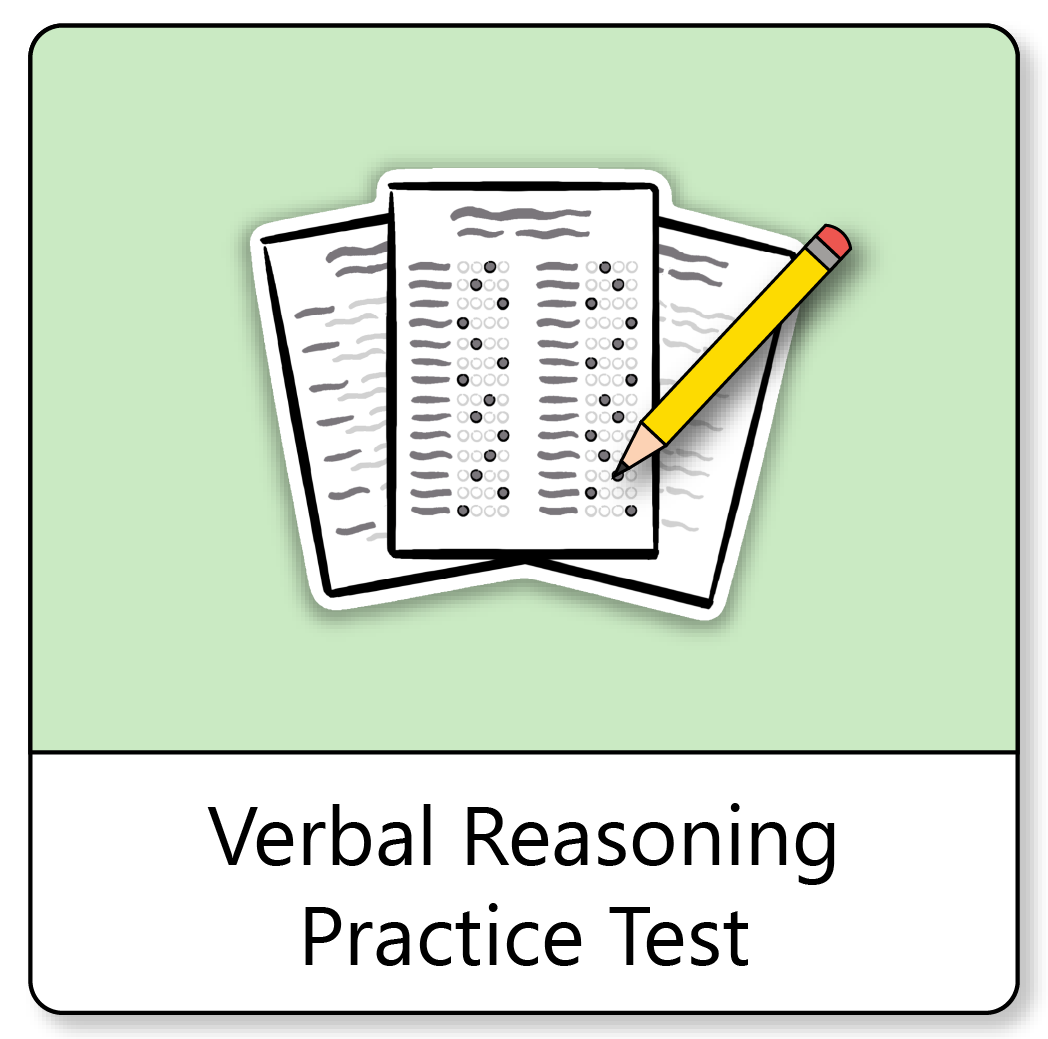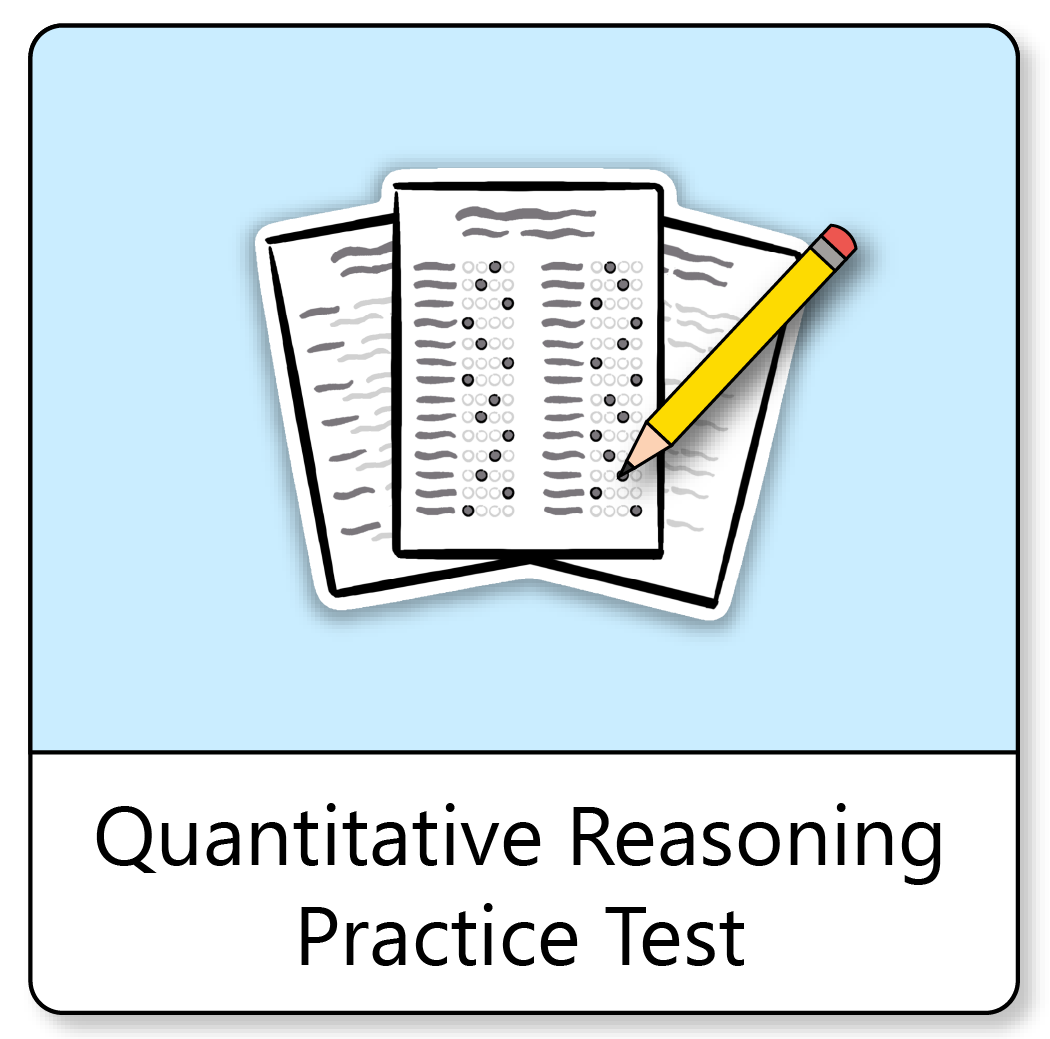If you need help studying for the GRE® or just want some more information about what the test is like, you’ve come to the right place.
Click below to take a free GRE practice test!
What’s on the GRE?
How to Register
GRE Scores
Retaking the GRE
GRE Online Course
What Test-Takers Are Saying
FAQs
Self-Assessment Modules
GRE Practice Tests
If you need some extra practice in a specific subject, click one of the subjects below to get started on a subject-specific GRE practice test.
What’s on the GRE?
The GRE test contains 54 questions and one essay, and you’ll be given just under 2 hours to take it.
Let’s take a closer look at the five sections of the GRE.
Analytical Writing (1 SECTION)
1 essay | 30 minutes
Verbal Reasoning (2 SECTIONS)
27 questions | 41 minutes
There are three different question types to test your reading and vocabulary skills:
These questions are your usual fill-in-the-blank questions. You’ll be given a sentence and have to fill in the blank with the correct vocabulary word. In some cases, the sentence may have multiple blanks, and some questions may ask you to fill in blanks spread out over an entire paragraph.
Sentence Equivalence
For these questions, you’ll be given a sentence and then asked to choose two words that would logically complete the sentence. The trick here is that you have to make sure both words you choose are correct; you won’t get partial credit if only one word is correct.
Reading Comprehension
For these questions, you’ll be given some passages to read and answer questions about. Each passage will be between 100 and 450 words.
Quantitative Reasoning (2 SECTIONS)
27 questions | 47 minutes
There are three different question types to test your ability to solve problems dealing with number properties and geometric figures:
These questions will present you with two quantities, and you’ll be asked to determine which quantity is greater. In some cases, the quantities will be equal.
Multiple-Choice
These are your standard multiple-choice questions. You’ll be given a question and a list of five answer choices, only one of which is the correct answer.
Numeric Entry
For these questions, you’ll have to input your answer into one or more boxes. If your answer is a decimal or an integer, it goes into a single box. If your answer is a fraction, the numerator goes in one box and the denominator in another box.
The good news is that you are allowed to use an on-screen calculator for the entirety of the Quantitative Reasoning section! You likely won’t need it for most of the questions, but rest assured that it’s there if you do want to use it.
How to Register
To get started with the registration process, you’ll need to create an ETS account via their website. From there, you can register to take the test.
GRE Scores
The GRE is scored in two parts. Your Verbal Reasoning and Quantitative Reasoning scores are calculated using a scaled scoring method. Here’s how it works:
For every question you answer correctly, you get one point added to your raw score. At the end of the test, your final raw score will be converted to a scaled score. This scaled score will range somewhere between 130 and 170.
The reason your raw score is converted to a scaled score is because everyone who takes the exam is given a slightly different set of questions. Since everyone has a different arrangement of questions, and because some questions are harder than others, converting your raw score to a scaled score ensures a more even playing field.
Your GRE essay is scored on a scale of 0-6.
The score you need to achieve differs from school to school, so there is no universal passing score for this test.
Retaking the GRE
If you didn’t get the score you wanted on your first try, that’s okay! You can retake the test up to five times per 12-month period.
Keep in mind that there is a mandatory 21-day waiting period between attempts.
Online GRE Prep Course
If you want to be fully prepared, Mometrix offers an online GRE prep course. The course is designed to provide you with any and every resource you might want while studying. The GRE course includes:
The GRE prep course is designed to help any learner get everything they need to prepare for their GRE exam. Click below to check it out!
What Test-Takers Are Saying
Don’t just take our word for it! See what real test-takers are saying about the GRE test:
“The quantitative comparison questions are obviously begging you to mistakenly ignore (or pick) option D. You have to be very careful with those, without eating up too much time of course. I didn’t have to do any calculations that were too lengthy, but they weren’t easy enough to solve in your head either.”

Thick_Butterscotch66
“The GRE is not a test of raw vocabulary. Instead of merely mugging up words, try to put them in context. Get a feel of how those words are used, where those words are used. Get a sense of whether a word is used in an approving sense or a disapproving sense. Try to appreciate the nuances between words that appear very similar in meaning but are still not interchangeable.”

Antariksh
Quora
“For the writing, I try not to think to hard about real-world examples. Think of the point you want to make and then think of an example. The more specific and profound the better, but you can use basic examples and do fine. I also write the intro and conclusion at the same time since they’re usually reflections of each other anyway. Further, this makes your essay seem somewhat put together in the event you run out of time.”

imanaturalblonde
FAQs
How many questions are on the GRE test?
The test contains 54 questions and one essay.
How hard is the GRE test?
The GRE test is considered to be moderately difficult, but easier than some other graduate admissions tests.
How long is the GRE test?
The time limit for the test is 1 hour and 58 minutes.
How much is the GRE test?
The testing fee is $220.
Can I use a calculator on the GRE test?
Yes, an on-screen calculator will be available during the Quantitative Reasoning sections.
Self-Assessment Modules
One of the most important parts of preparing for a test is determining which topics you need to brush up on as you study.
To get started with a self-assessment of your knowledge, click on one of the modules below!
English
GRE and Graduate Record Examinations are registered trademarks of Educational Testing Service, which is not affiliated with Mometrix Test Preparation and does not endorse this page.



 GRE Online Course
GRE Online Course GRE Study Guide
GRE Study Guide GRE Flashcards
GRE Flashcards





